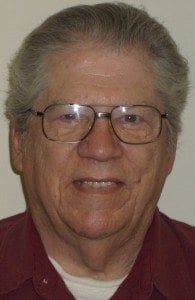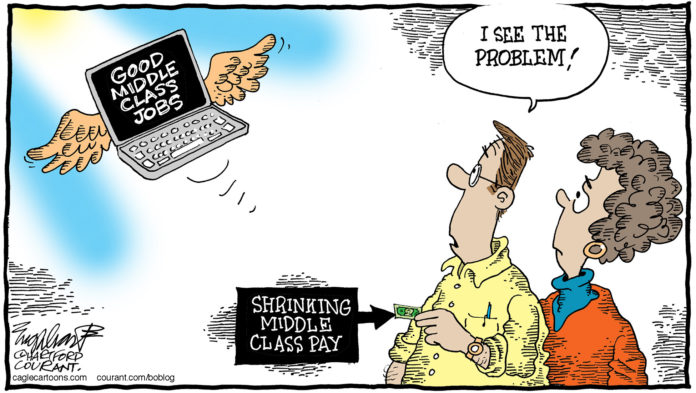BY KENNETH WELLS
 The phrase “middle class” is fast disappearing from national, state and county political vocabularies. This should not be a surprise to any of us.
The phrase “middle class” is fast disappearing from national, state and county political vocabularies. This should not be a surprise to any of us.
Those that did consider themselves middle class – with a family income that allowed them to live comfortably – are now “ordinary,” according to Sen. Bernie Sanders. Sen. Rand Paul defines them as “people who work for people who own businesses.”
Many of us may consider ourselves “ordinary,” but individuals currently working two or more minimum wage jobs, under 20 hours per week, for $7.25 per hour consider themselves to be something other than Sen. Paul’s definition.
Indifference has now defined them as “those left behind.”
The definition of middle class has long been evolving with politicians. It has ranged from “submerged middle class” to “nearly poor” to “the sandwich generation.”
Today, our current Republican candidate hopefuls’ definitions are anything but poor. Yesterday, middle class defined the bulging middle segment of our population. It knew employment security, looked forward to children attaining greater heights than parents, usually had a savings account and were buying their own homes. In short, they were participating in a sustainable future.
The strength of that American middle class grew rapidly with the expansion of the labor movement from the 1940s into the 1970s. Rather than “a chicken in every pot” during the Great Depression, the chant became “a car in every garage.”
The Republican declaration that “unions cause a loss of current jobs and keep new jobs from being created” has inspired our “red states” to pass “right to work laws” which obstruct attempts to organize workers and develop livable wages. With the stagnation of middle class wages, political theorists are now rethinking their definition of middle-class and upper-middle class wage earners.
A recent Gallup Poll indicates that 51% of Americans consider themselves to be in these two groups. With this majority, it is no wonder that our current Republican presidential candidates are not discussing today’s true financial inequality, developed during the last four decades through two attempts at “trickle down economics.”
Reagan cut taxes. Too late, he raised them attempting to recoup the deficit he faced. Smiling all the while, Bush 43 let us sink into the deepest recession since the Great Depression.
The idea that “cutting taxes for the upper 10% will make more jobs” is lame. That 10% have the financial ability to spend without any more help. The people who do not have the financial ability to spend are those who cannot find employment or are barely surviving, working two plus jobs to keep their family together in our new tax-cuts-for-the-wealthy/right-to-work environment.
To address the above fairly, blame for today’s inequalities in education, health, social welfare and financial stability does not entirely rest at the feet of the Republicans. There is enough blame to go around.
It starts with the large numbers of adults who do not register to vote and is further exacerbated by those who are registered but do not vote. If those few thousand individuals who profess that “my vote does not count” did in fact, vote, history would be made!
– Kenneth Wells lives in Ratliff City, OK, and is a regular contributor to The Oklahoma Observer. His essays appear in newspapers across southwestern Oklahoma.








